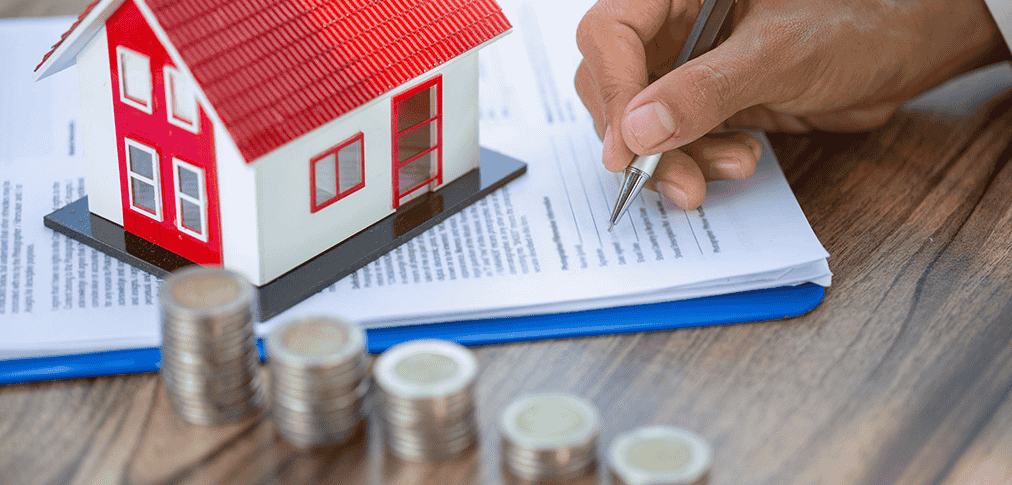When you’re dealing with the stress of repossession, the last thing you want to worry about is how long it will take to get back on your feet. While the timeframe for getting another mortgage after repossession can vary depending on your lender and credit situation, there are some general guidelines available. In this article, we provide you with all the information you need about getting a mortgage after repossession.
The Topics Covered in this Article Are Listed Below:
- What Is Repossession?
- Can I Get a Mortgage After Repossession?
- What Factors Will Affect My Mortgage Application After Repossession?
- Can I Remortgage After Repossession?
- How Soon Can I Get a Mortgage Post-Repossession?
- How Will My Repossession Affect My Mortgage Offer?
- How Can I Improve My Chances of Being Approved for a Mortgage Post-Repossession?
- Next Steps
What Is Repossession?

Repossession is the legal process by which a lender exercises their right to take back a property and sell it in order to reclaim the funds owed by the borrower. In most cases, a typical repossession occurs when the borrower fails to make the required payments on their mortgage. The lender sends a notice to the borrower informing them that they have defaulted on their loan and that they have a certain amount of time to remedy the situation. If the borrower does not take action, as a last case resort the lender will take back the property, stopping the borrowers from having access, and sell it to reclaim the funds owed by the borrower.
In some cases, the borrower may be able to negotiate with the lender to avoid repossession. However, if the negotiations are unsuccessful, the repossession company will move in and take possession of the property. The process of repossession can be stressful and costly for both the borrower and the lender. It's important to remember that once a property has been repossessed, it can be difficult to get it back or for the borrower to secure a new mortgage.
Can I Get a Mortgage After Repossession?
The short answer is yes, it is possible to get a mortgage after repossession. However, it will likely come with some challenges and the lenders available to you will depend on how recent the repossession was. When applying for a mortgage, lenders look at your credit history to see how you have managed your finances in the past. If they see that you have had a property repossessed previously, they may view you as a higher risk borrower and could either deny your application outright or offer you less favourable terms, such as a higher interest rate.
That being said, there are some lenders who specialise in bad credit mortgages and may be more willing to work with you, even if you have a repossession on your record. If you’re interested in pursuing this option, we recommend that you speak with an independent, specialist mortgage broker such as John Charcol. We have access to mortgage products and providers from across the market, so we can compare your options and find a lender that’s right for you.
What Factors Will Affect My Mortgage Application After Repossession?
There are a few factors that come into play when applying for a mortgage after a repossession.
When the Repossession Took Place
The further in the past your repossession occurred, the more likely you are to be approved for a mortgage. Lenders will see that you have had time to rebuild your finances and establish a good track record of making payments on time.
If your home was repossessed within the last 3 years, you’ll find it harder to secure a mortgage. There’s handful of lenders that don’t require that a minimum number of years have passed since the repossession but these tend to come with strict criteria and whether you qualify will be down to the underwriter’s assessment of your unique situation.
For situations where the repossession occurred 3 - 6 years ago, there will be more lenders willing to consider your application, but these will likely still come with caveats that may limit your max LTV (loan-to-value).
If your repossession was more than 6 years ago, you’ll have access to most lenders and more competitive deals, including some high street ones.
The Reason for the Repossession
Some mortgage providers will consider the reason for the repossession when assessing your application. If the repossession was due to extenuating circumstances beyond your control - such as job loss, illness, or being a victim of fraud - this will be viewed more favourably than if it was due to negligence on your part. Be honest with your broker and provide as much detail as possible about the circumstances that led to the repossession. Your broker will then be able to match you with a lender willing to consider these factors.
Whether You Defaulted on a Mortgage with a Lender that’s Part of a Wider Collective
If you try to apply for a mortgage with the lender that repossessed your home, they're unlikely to accept you. This is important to keep in mind, as many lenders (particularly high street lenders) are part of a larger group of companies, all of which share information about your mortgage history. So, if one lender in the group has repossessed your home, it's unlikely that any other lender in the group will lend to you in the future.
The Amount of Money Involved in the Repossession
The amount of money linked to the repossession may also have an influence on your mortgage application, especially if it is significant. If the repossession was for millions of pounds or several mortgages, it may be even more challenging and costly to get a mortgage.
Conversely, many more lenders will consider your application if the repossession was more than 6 years ago and was a single mortgage repossession on a small property. That said, the actual likelihood of your application being approved and the mortgage rates offered will depend on other factors surrounding your application as well as the lender’s criteria.
The Presence of Legacy Payments
If you're looking to get a mortgage after your home has been repossessed and you're still making legacy payments, this can make the process more difficult. A legacy payment is a monthly amount that you pay to cover the amount that you still owe on the property. It's essentially an agreement between you and the lender to cover the shortfall from the property’s sale. While some lenders may be willing to offer you a mortgage despite having a legacy payment, others will view it as a sign that you're not in a position to afford a mortgage and will reject your application outright.
Whether You've Had More Credit Issues
Borrowers who have had their property repossessed typically suffer from additional credit issues such as late payments, arrears, defaults, CCJs, bankruptcy and other difficulties. This is due to the fact that a mortgage is generally the last thing people default on when they’re having money problems. The number of lenders who will accept your application gets smaller the more credit issues you’ve had.
How You've Managed Your Finances Since the Repossession
One of the most important things lenders will consider when reviewing your application is how you’ve managed your finances since the repossession.
This includes factors such as whether you have:
- Settled your defaults - if you have any defaults on your credit file, it's essential to make sure that these have been settled as soon as possible. This shows lenders that you're taking responsibility for your debt and are working to improve your financial situation
- Kept up with your credit commitments - lenders will also look at whether you've kept up with your other credit commitments since the repossession. This includes things like credit card payments, personal loan repayments, utility bills, etc.
- Managed new credit - taking out new credit or having an overdraft or additional credit cards isn’t something you necessarily need to avoid as long as you’re successfully managing them alongside your other finances. In fact, it can be a way to help rebuild your credit score. However it’s unadvisable to take out new credit if you’re concerned about managing your finances
- Made an effort to improve your credit score - this will be viewed favourably by lenders. Make sure you're on the electoral roll, keeping up with credit commitments and not applying for too much credit in a short space of time
- Regular income - this shows that you have the means to meet your mortgage payments and are less likely to default on the mortgage
Lenders want to see that you've improved your financial situation and that you're in a better position to afford a mortgage now than you were at the time of the repossession. By taking these steps and demonstrating that your finances are in order and that you have a regular income, you'll be in a much better position to get approved for a mortgage post-repossession.
Can I Remortgage After Repossession?
Although you may have experienced repossession in the past, it's still possible to obtain a remortgage. The terms and conditions of a remortgage are similar to those of a standard mortgage and generally remortgaging is a bit more straightforward. Speak to one of our advisers to find out about your remortgage options.
How Soon Can I Get a Mortgage Post-Repossession?
The amount of time it takes to be approved for a mortgage post-repossession varies depending on the lender. High street lenders typically require at least 6 years to have passed since the repossession occurred before they'll consider your application, while most building societies and specialist lenders will consider your application if the repossession happened 3 – 6 years ago. Finally, there’s a handful of lenders without criteria dictating that a minimum number of years must have passed since the repossession before they’ll consider your application. This is why it’s best to use a mortgage broker like John Charcol; we know which lenders are most likely to consider your application and where you can get the best deal.
It's also worth mentioning that if you’ve had a repossession within the last 6 years, you may find that the deals available to you have a lower maximum LTV and possibly higher rates.

How Will My Repossession Affect My Mortgage Offer?
When you apply for a mortgage, the lender will conduct a credit check as part of their assessment. This will show any previous repossessions on your record within the last 6 years and will likely impact the interest rate you're offered and the size of the loan that's approved.
Many lenders will also ask you when submitting your application if you’ve ever had a property repossessed – even if it was more than 6 years ago.
It's important to remember that each lender has their own criteria for assessing applications and that a repossession on your record may not necessarily mean you'll be declined for a mortgage. However, the specialist lenders that do accept applications from those with a repossession on their record will often charge a higher interest rate and demand a bigger deposit to offset the increased risk.
As an expert mortgage broker, we’ll look at your situation and guide you towards the right lender with the best deal for your circumstances.
How Can I Improve My Chances of Being Approved for a Mortgage Post-Repossession?

As well as improving your finances and credit score, there are several ways you can improve your chances of being approved for a mortgage post-repossession:
- Save for a larger deposit - lenders often view borrowers with a larger deposit as being less of a risk, so the more you can save, the better the deals available to you
- Don’t limit yourself to high-street lenders - adverse credit lenders manually underwrite applications which means they’ll be able to better understand your circumstances than most high street lenders and will be more likely to consider your application
- Use an independent, specialist mortgage broker - at John Charcol we have a strong understanding of the specialist lenders in the market and are able to match you with one that's more likely to accept your application
Next Steps
If you're thinking of applying for a mortgage post-repossession, make sure to get in touch with us at John Charcol. We have a wealth of experience in helping people with bad credit secure the mortgages they need. Our team of experts work with you to understand your circumstances and find the right lender for your situation. Simply get in touch today on 0330 433 2927 to see how we can help.
First-Time Buyer Mortgages
Discover the best first time buyer mortgage rates available and the latest advice from John Charcol: mortgage broker for first time buyers.
Applying for a Mortgage
Applying for a mortgage couldn’t be simpler with our easy and simple guide from application to accepting your offer.
How Much Can I Borrow?
This mortgage calculator examines your income and works out how much money a mortgage lender might provide you with
House Buying Mortgage Guide
Are you looking to buy your first home? Or perhaps want to move to a new area? Our step-by-step guide will tell you everything you need to know about buying a house.
Help to Buy Guide
Support from the government-backed Help to Buy initiative is available for first-time buyers and existing homeowners who are finding it difficult to move up the housing ladder.
House Mortgage Deposit
Saving a mortgage deposit for a house is definitely one of the biggest hurdles you face as a buyer. In our guide we explain how deposits work and ways you can save.
Mortgage Deposit Amounts
Learn all about the different mortgage deposit amount options, how they affect your mortgage, how they vary depending on what type of borrower you are & more.
Funding Home Improvements
There are a few ways to finance work on a house: get a home improvement loan, remortgage for home improvements, ask your lender for a further advance & more
Mortgage Glossary
On this page you’ll find our detailed mortgage terminology glossary. There’s a lot of jargon out there but we’re here to make it easy.

